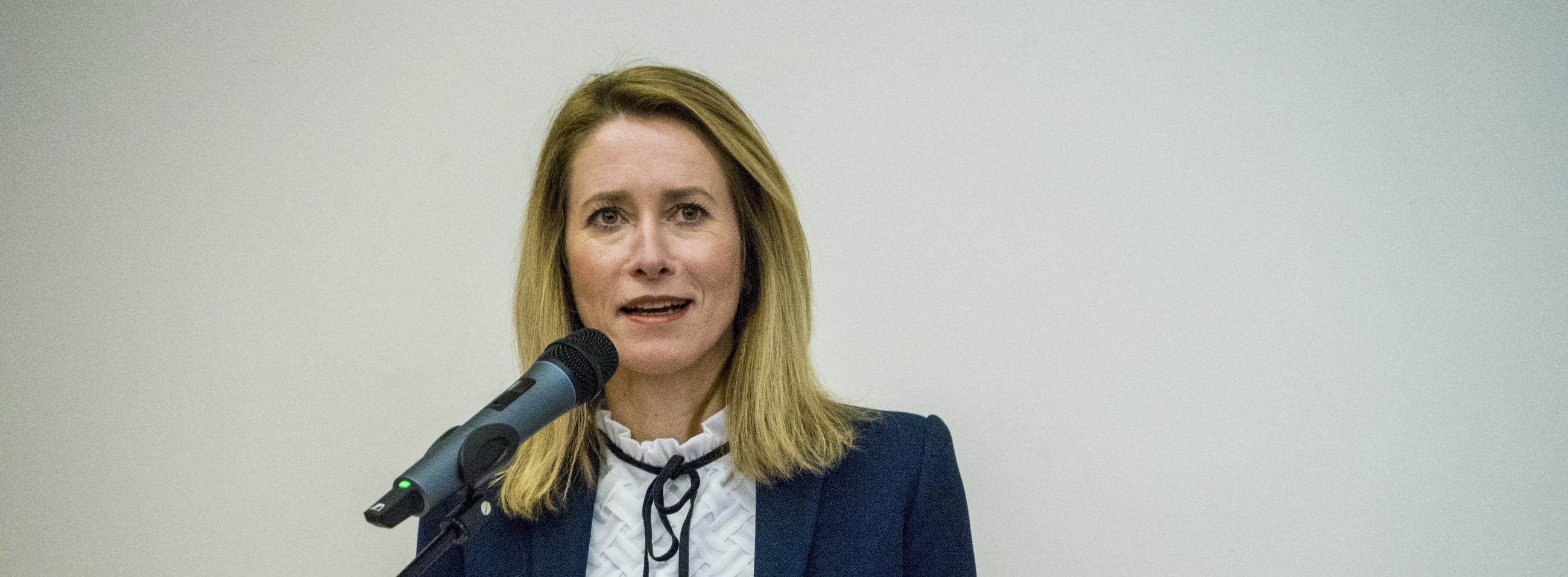Peaminister Kaja Kallas osales Tallinna Ülikoolis rahvusvaheliste suhete sümpoosionil
28.02 toimus Tallinna Ülikooli ühiskonnateaduste instituudis rahvusvaheliste suhete sümpoosion, kus aukülaliseks oli peaminister Kaja Kallas.

Kümnendat korda toimunud rahvusvaheliste suhete konverentsil arutleti aktuaalsetel teemadel nagu sõda, suhted erinevate riikidega, kriis, turvalisus jt. Pärast peaministri esinemist said üliõpilased ja teised sümpoosionil osalejad küsida Kaja Kallaselt küsimusi ja teha pilti.
Sümpoosioni peakorraldaja, TLÜ rahvusvaheliste suhete lektor Terry McDonald tänas peaminister Kaja Kallast võimaluse eest temaga otse suhelda ja küsimusi esitada. Ka tudengid olid omalt poolt mitmeid küsimusi ette valmistanud, sealhulgas üliõpilased Ukrainast. Kaja Kallas rääkis lähemalt ka sümpoosioni põhiteemal (the Great Unsettling and Globalization), luues silla päevateemaliste küsimuste ja tänase fookuse vahel. Terry McDonaldi sõnul näitas see, et peaminister oli valmis vastama ka ruumis viibivate õpilaste spontaansetele küsimustele, tema osavust ja kogemust tänapäeva maailma probleemide lahendamisel. Mitmed üliõpilased, ka Ukrainast, hindasid võimalust rääkida kellegagi, kes suudab poliitikat mõjutada.
Theme: The Great Unsettling
We find ourselves in an era of vast and connected crises. Migration, war, food and energy shortage, climate catastrophe, pandemics, increasing levels of inequality and poverty, and more have moved from peripheral problems and now disrupt Global North realities. It is in this context that the diverse structures and relations of power need to be questioned, and solutions that understand the inequalities of these realities must be considered.
There is a concept in Globalization Studies of “The Great Unsettling” - that humans everywhere have lost much of what was secure in their lives and their understanding thereof. Now, facing this new era, we must engage with what must be built to replace or augment the certainties of the previous world, if they existed at all, and how we can integrate human society into these new times of reckoning.
In this conference, we invite scholars from all disciplines who wish to engage in the debate of what we have that is worth saving, and what must be built anew. While our focus is on international relations, we welcome all perspectives to join us in discussing how humanity must adapt to this era of wicked problems - how we got here, where we are, and where we must go in order to build a more just and sustainable international order.
9:00 Registration with coffee
9:30 Introduction by Lecturer of International Relations Terry McDonald and the opening
address by Tallinn University’s Director of School of Governance, Law and Society Dr. Indrek
Grauberg
10:00–10:45 Opening address by Prime Minister Kaja Kallas, followed by Q and A with PM
Kallas and Terry McDonald
11:00–12:15 Panel 1: War in Ukraine
Jyrki Käkonen – War in Ukraine in the context of world system analysis and power transition
theories
Matthew Crandall – Small state influence and the war in Ukraine
Mariam Tarasashvili – New era of uncertainties: How U.S. Democracy Promotion Works in
Times of War
12:15–13:15 Lunch (at own expense)
13:15–14:30 Panel 2: State Capture, Radicalization, and Challenges to Democracy
Leif Kalev – Unlocking the Great Unsettling in Democratic Governance: The Opportunities of
Democratic Citizenship Education
Victor Jimenez Rivera – “Legitimacy and State Capture: The Role of EU Conditionality and
Russian Influence in Enabling State Capture in Serbia”
Catlyn Kirna – The colour of my Bugatti is fascism – the online radicalisation of youth
Sebastián Umpierrez de Reguero – Pathways to External Citizenship: The Global Extension of
Dual Citizenship and External Voting Rights Across Regime Types
14:30–14:45 Coffee break
14:45–15:45 Panel 3: Peace Building and Reinterpreting IR
Christiana Charley – The Role of South Sudanese Business Women and Local Activists in the
Peace Process of South Sudan
Birgit Poopuu – Feminist solutions to the problems of international politics
Terry McDonald, Benjamin Klasche – Hivemind: What Bees Can Teach Us About World Peace
Nadège Nzeyimana – Inserting agency in Sino-Africa discourse: analysis of Rwanda's foreign
policy from the perspective of its relationship with China
15:45–17:15 Understanding the Great Unsettling in Migration and Integration:
Contribution of the MIRNet Project
Russell King – Relocating East-West Migration and (Im)Mobilities
Raivo Vetik – Relationalism in Understanding Migration, Integration and Citizenship
Mari-Liis Jakobson – The Anxieties of Migration and Integration in Turbulent Times
Leif Kalev – Ideations in Migration and Integration Politics, Policy and Governance
17:15–17:30 Closing remarks
Jyrki Käkönen
Terry McDonald
18:30 Social event / Project Wrap Celebration – Old Town
The organizers reserve the right to change the schedule.